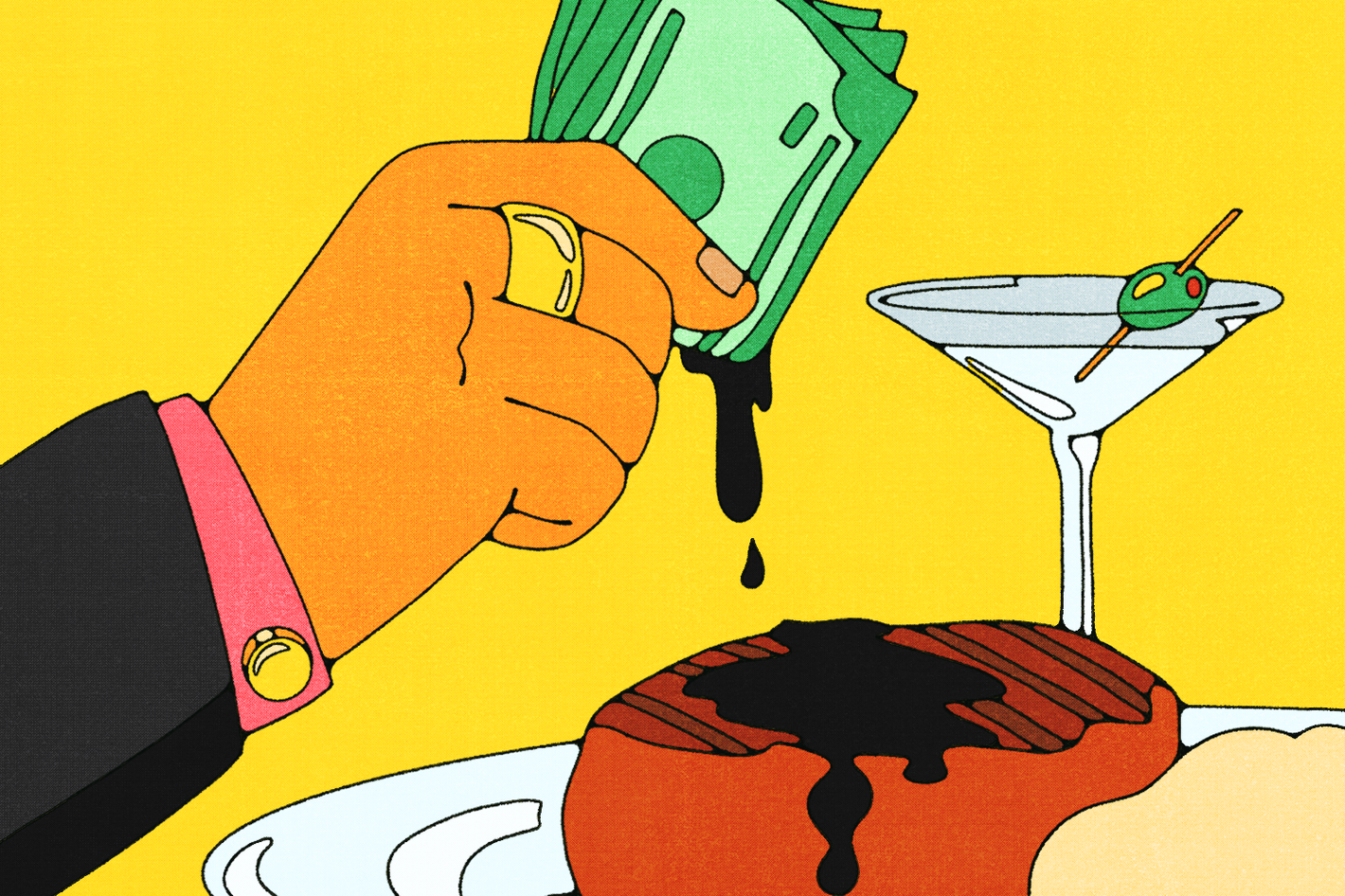when you want, where you want.
What Trump Means for Tips
 Illustration: Kate Dehler
Illustration: Kate Dehler
During the nascent years of the first Trump administration, I worked as a captain at the Grill, the former Four Seasons dining room where on any given night I dropped checks that totaled more than a year’s tuition at a public university and took orders for individual bottles of wine that cost more than my monthly Manhattan rent. Serving filthy rich customers in exclusive places like Carbone and the Grill when the rich are getting richer, as they did under Trump’s first term, means watching the joy they take in spending copious amounts of their money, which made it easier to convince them to buy obnoxiously expensive steaks and shellfish towers each night. The years I spent at the Grill were the most money I’ve ever made in any job; in 2018, I cleared six figures, most of it in tips.
“The Trump years were definitely the best years for me financially,” says Randy Kuszmaul, who worked as a server at Del Frisco’s Double Eagle Steakhouse, within walking distance of Fox News headquarters, between 2018 and 2019. “Most people who came in to Del Frisco’s when Trump won the first time felt like those four years were one big victory lap and were spending accordingly.”
During Trump’s first term, Jameson Brown was the assistant general manager of Jean-Georges Vongerichten’s private restaurant inside 220 Park, a luxury residential tower, where he witnessed a spike in luxury spending among the building’s ultrawealthy residents. “For people in this tax bracket, they might buy out the entire restaurant just for a meeting, which could cost up to $30,000 depending on the time of year,” he says. “You saw more of that activity in the earlier days of Trump, as opposed to during the Biden administration, where things got a little more constrained for the corporate sector.”
Whether you agree with Trump’s policies or not — and to be clear: I do not, at all — conventional wisdom suggests that a return to his unbridled, pro-billionaire, anti-tax ways will bode well for aspirational fine dining in NYC. Many restaurant workers say there is already a groundswell of euphoria building around the prospects of a second Trump term.
Kuszmaul has a new job at Koi, a high-end sushi restaurant in midtown, and sees signs that big spenders are primed to spend big again, especially on luxury items like Hokkaido uni and high-end sake. “Clientele seems to be cutting loose a little more,” he says. “There’s a lot of celebratory drinking going on all of a sudden.” Brown, who now works as the lead host for the new Gjelina, expects a big push toward exclusivity upon Trump’s return to office. “We’re already seeing the trend of more private clubs and members-only restaurants popping up, and I think that trend will accelerate under Trump 2.0, especially for those who can afford it.”
The euphoric spending reminds Stefanie Schwartz of her time working as a sommelier at Le Coucou during the first Trump term, when wine drinkers would rarely balk at the $500 bottles she’d recommend. “I do anticipate people balling out a bit more in the next few months with the broad assumption that the Über-wealthy did vote a certain way and maybe they’re feeling celebratory,” she says. But Schwartz and other wine professionals also worry how Trump’s promised tariffs on imported goods may impair their ability to keep prices down, especially for rare European wines. “If wine tariffs do come around,” says Schwartz, now a sommelier at Carne Mare on Pier 17, “prices are going to increase.”
Others, however, note that some customers possess such an extreme degree of wealth that they’re insulated against any economic factors that might affect more run-of-the-mill affluence. “The same person who was drinking 25-year-old Pappy Van Winkle for $550 a shot four weeks ago is probably drinking 25-year-old Pappy Van Winkle this week, too,” says Adam Spetler, who bartends at a well-known midtown Italian restaurant that is established enough, he says, to be more or less immune to political crosswinds.
Kuszmaul says he intends to reap the benefits while he can, knowing that any economic windfall could be short-lived: “I’m concerned that his policies might end up grinding the economy to a halt.” Having lost his restaurant job during the pandemic, along with millions of other hospitality workers who became unemployed under Trump’s watch, Kuszmaul is bracing for the worst but hoping for the best.
Among most workers I talked to at power rooms around the city, there is a spirit of what I would call nauseous optimism: The take-home pay will go up, but at what cost, especially if Trump’s long-promised mass deportations come to fruition and restaurant workers are affected? “I don’t think that the money I stand to gain is worth the risk of regression in terms of the rights that we currently have as American citizens,” says Alicia Bagley, a server at chef John Fraser’s Iris, an elegant Mediterranean restaurant in midtown. “The reward isn’t greater than the potential harm that it’s causing to so many different groups of people.” She, like others, expects a bumpy but profitable ride.
Related
All Rights Reserved. Copyright , Central Coast Communications, Inc.